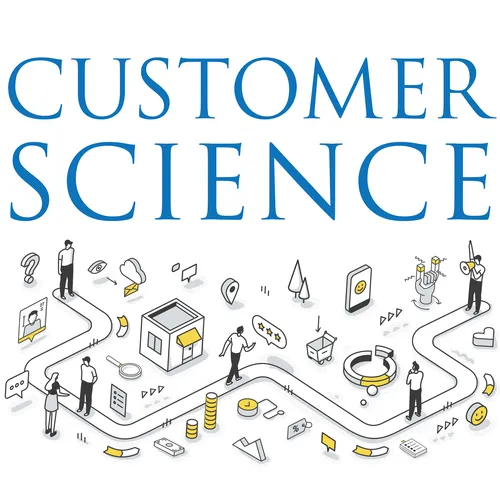
Customer Science
This podcast is based on The Customer Science Handbook by Alexander Chernev, professor of marketing at the Kellogg School of Management at Northwestern University. Drawing on decades of research in psychology, behavioral economics, and marketing, it examines the forces that shape customer behavior and offers a systematic approach to creating transformative customer experiences.
- Update frequency
- every day
- Average duration
- 22 minutes
- Episodes
- 46
- Years Active
- 2025

The Principle of Loss Aversion
Loss aversion explains why losses hurt more than equivalent gains feel good—a core principle in understanding customer reactions and choices. The episode shows how this bias influences everything fro…

Drawing Inferences
When information is incomplete, consumers make inferences based on visible cues using halo effects or compensatory logic. This episode explains how price, shape, or brand reputation can lead to assum…

Creating Value in Business Markets
This episode examines decision-making in business markets through the lens of behavioral science, showing that managers—like consumers—are influenced by functional, psychological, and financial consi…

Identity Loyalty
This episode examines identity loyalty, where customers form connections with brands that reflect or enhance their self-concept. It explains how people use products to express who they are or aspire …

The Principle of Diminishing Marginal Value
This episode examines the diminishing marginal value principle, which explains why improvements in a product’s performance have decreasing impact as performance levels rise. It illustrates how compan…

Thinking and Deciding
This episode introduces the two main systems of thinking—automatic (System 1) and deliberate (System 2)—and how they shape our decisions. It explores how intuition often drives everyday choices, whil…

From Choice to Purchase
This episode explores the gap between customer choice and actual purchase, emphasizing how decisions often don’t immediately translate into action. It discusses the influence of marketing, social pre…

Overcoming Habituation
Over time, even the most exciting offerings can become routine, leading to decreased enjoyment through a process called habituation. This episode explains the psychological roots of habituation and p…

Understanding Customer Loyalty
This episode introduces the concept of customer loyalty as a multidimensional phenomenon that includes both behavioral patterns and emotional commitment. It outlines four key types of loyalty—functio…

Behavioral Loyalty
This episode dives into behavioral loyalty, which stems from habit rather than conscious decision-making. It describes how routine purchasing behavior is formed, reinforced, and maintained, and why d…

Managing Customers to Build Loyalty
In this episode, the focus is on managing customer experiences to build loyalty through service quality and recovery. Using the service-gap model, it outlines how to identify and close discrepancies …

The Invisible Influence of Choice Context
This episode examines how seemingly irrelevant factors in the choice environment—like framing, order, and comparisons—influence what people choose. It delves into context effects such as the compromi…

Choice Overload and Decision Fatigue
This episode discusses how having too many options can lead to choice overload, reducing decision satisfaction and purchase likelihood. It explores strategies for simplifying choices, such as limitin…

The Power of Defaults
This episode explores how default options powerfully shape decisions by reducing effort, leveraging loss aversion, and signaling social norms or implicit endorsements. It distinguishes between hard a…

Action Drivers and Action Barriers
This episode explores two key behavioral strategies for closing the gap between choice and purchase: boosting action drivers and eliminating action barriers. Action drivers work by increasing the sal…

Cognitive Barriers to Action
Cognitive barriers such as performance, preference, and choice uncertainty can undermine customers’ confidence and prevent purchases. The episode outlines how difficulty in assessing benefits, ill-de…

Emotional Barriers to Action
This episode focuses on anticipated regret as a powerful emotional barrier that hinders customers from acting on their choices. It explains how forward-looking emotions and counterfactual thinking ma…

Consumption as an Experience
This episode examines the nature of consumption beyond functionality, highlighting how people engage with products and services as immersive experiences. It explores the emotional, cognitive, and sen…

Crafting Experiments to Establish Causality
This episode focuses on how experimentation is used to determine cause-and-effect relationships between marketing actions and customer responses. It explains the principles of controlled experiments,…

The Principle of Reference-Point Dependence
This episode unpacks the concept of reference-point dependence, illustrating how people assess value based on comparisons to a known benchmark rather than absolute performance. Examples from Olympic …